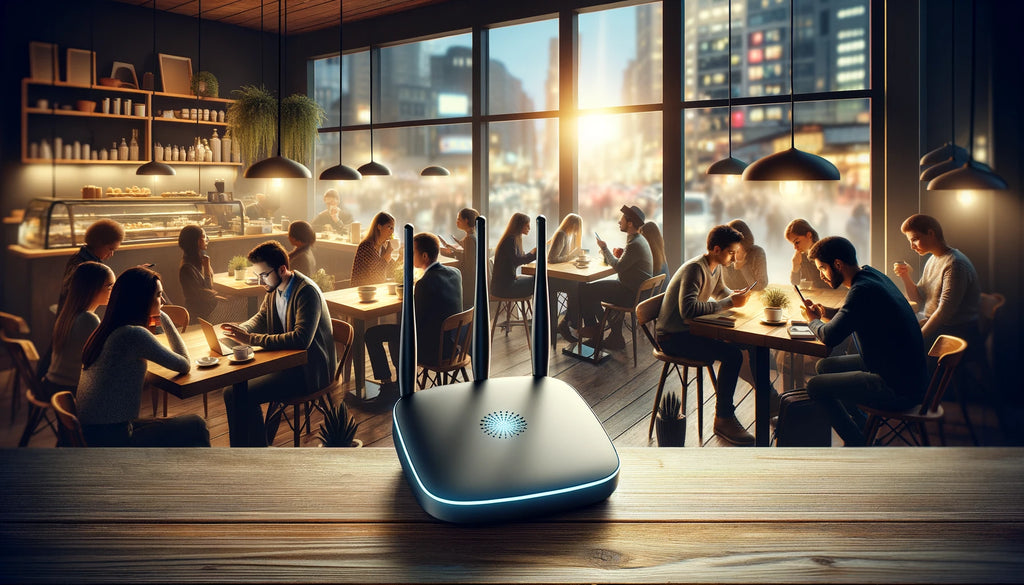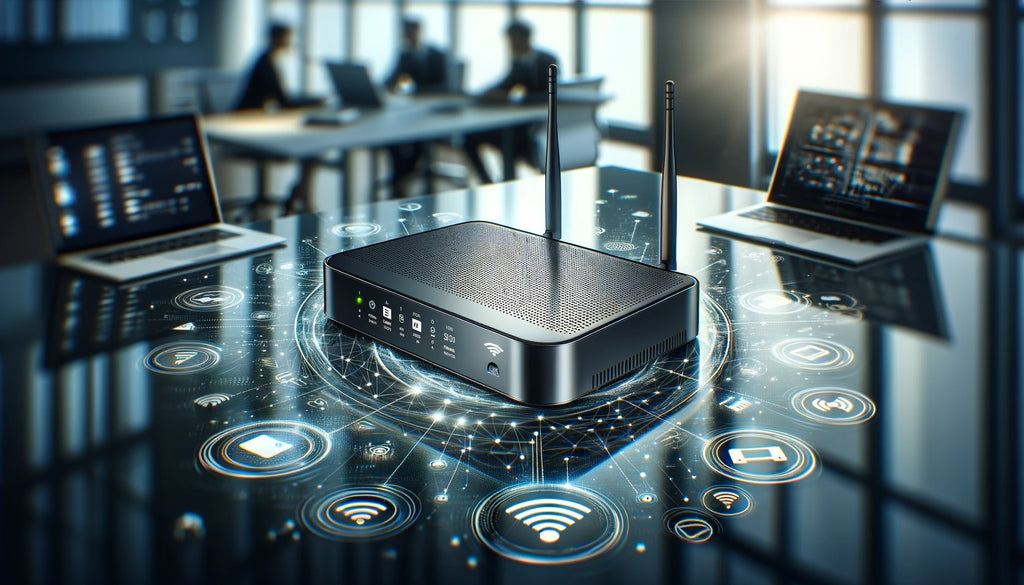Introduction
In today's fast-paced world, staying connected is more than a convenience—it's a necessity. Whether you're working from a remote beach, navigating the urban jungle, or simply ensuring your family stays in touch on vacation, the internet is your best friend.
But when it comes to mobile internet, the dilemma often comes down to choosing between portable routers and mobile hotspots. Both have their merits, but which one fits your pocket and lifestyle better? Let's dive in, break it all down, and help you make that call.
Understanding Portable Routers
What Are Portable Routers?
Imagine you're setting up a tiny, invisible thread that connects all your devices to the vast world of the internet, anywhere you go. That's essentially what portable routers do.
They grab cellular data signals and convert them into a Wi-Fi network that your devices can latch onto. Unlike your home router, these gadgets are built for travel, with batteries to keep them going and the ability to connect to various cellular networks for the best possible coverage.
Understanding Portable Routers
| Feature | Description | Use Case | Advantage |
|---|---|---|---|
| Multi-device Connectivity | Ability to connect several devices simultaneously. | Group travel, family use, remote work setups | Ensures everyone stays online without hassle. |
| Extended Battery Life | Long-lasting operation on a single charge. | Outdoor activities, long work sessions | Provides all-day connectivity without recharging. |
| Wide Coverage | Strong signal strength over larger areas. | Large homes, outdoor settings | Keeps devices connected even at a distance. |
| Enhanced Security | Advanced encryption and secure connection options. | Handling sensitive information | Protects data from unauthorized access. |
| Customizable Settings | Adjustable network settings like SSID and password. | Personal and guest use | Allows tailored connectivity experiences. |
Advantages of Portable Routers
- Connectivity for the Crew: Portable routers are the unsung heroes of group travel. Heading out with friends or family? These devices can support multiple connections, ensuring everyone's devices are online.
- Control at Your Fingertips: They give you more control over network settings. Want to set up a guest network or manage how much data junior is chewing through on TikTok? Portable routers have you covered.
- Born to Roam: With support for various networks and bands, these routers are like globetrotters, ensuring you get the best possible connection whether you're sipping espresso in Rome or trekking in the Rockies.
Ideal Use Cases for Portable Routers
- The Digital Nomad's Companion: For those who work with a scenic view, a portable router ensures your Zoom calls don't freeze and your uploads don't crawl.
- Family Vacations: Keep the whole family entertained on long road trips or in remote vacation spots, with multiple devices connected seamlessly.
- Backup Internet: For those critical moments when your home internet decides to take a nap, a portable router is a reliable backup.

Understanding Mobile Hotspots
What Are Mobile Hotspots?
Imagine turning your smartphone into a magic wand that beams internet access to your laptop, tablet, or even your friend's phone. That's essentially what a mobile hotspot does. With a simple setting toggle on your smartphone, you transform it into a portable internet provider, sharing its cellular data connection with other devices via Wi-Fi. It's the Swiss Army knife of connectivity—always in your pocket, ready at a moment's notice.
Advantages of Mobile Hotspots
- Simplicity in Spades: There's nothing to carry but your phone, making it the epitome of convenience, especially for light users or in a pinch.
- Instant Setup: With just a few taps, your hotspot is live. No extra devices, no waiting for connections to establish. It's internet access in an instant.
- Cost-Effective: For those who rarely need to connect multiple devices on the go, the mobile hotspot uses your existing phone plan, avoiding the need for additional devices or subscriptions.
However, it's crucial to consider that mobile hotspots might not always be the powerhouse of connectivity you need. Here are a few things to keep in mind:
- Battery Drain: Using your phone as a hotspot can consume battery life at an alarming rate, leaving you in search of power outlets rather than enjoying your mobile freedom.
- Limited Connectivity: While convenient for solo use or emergency situations, hotspots generally support fewer connections and may offer slower speeds compared to portable routers, especially under heavy use.
- Data Usage: Depending on your mobile plan, using your phone as a hotspot can quickly eat into your data allowance, potentially leading to extra charges or throttled speeds.
Ideal Use Cases for Mobile Hotspots
Considering the strengths and limitations, mobile hotspots are best suited for:
- Solo Travelers: If you're mostly connecting your own devices and travel light, the mobile hotspot is a straightforward solution.
- Emergency Internet: When your main internet connection goes down, a mobile hotspot can be a quick temporary fix until things are back up and running.
- Light Internet Use: For checking emails, browsing the web, or other tasks that don't demand much data or speed, hotspots can handle the load without breaking a sweat.
In balancing the convenience of mobile hotspots with their limitations, it's clear they serve a niche but vital role in our connected ecosystem. Yet, for those who need reliable connectivity for multiple devices, without the drawbacks of drained batteries and limited data, portable routers stand out as the more robust option.
Comparing the Two
![]()
When it comes to portable routers and mobile hotspots, each has its place in the pantheon of personal technology. However, a closer look at performance, connectivity, battery life, and cost can help us discern which option might suit our needs better.
Performance and Connectivity
Portable routers are designed with the sole purpose of providing internet access, which allows them to pack a more powerful punch in terms of performance and connectivity. They typically offer:
- Better Range: Able to cover more ground, ensuring you remain connected even as you move around a larger space.
- Higher Speeds: Equipped to handle more data-intensive activities, from streaming high-definition videos to supporting seamless online gaming experiences.
- Increased Device Capacity: Ready to connect multiple devices at once without a significant drop in speed or quality, making them ideal for group settings.
On the other hand, mobile hotspots can provide a convenient quick fix but might struggle with:
- Range Limitations: Best used in close proximity, as the signal strength decreases with distance.
- Variable Speeds: Dependent on the phone's current signal strength and may fluctuate more than a dedicated portable router.
- Limited Connections: Designed for fewer devices, which might be a bottleneck for productivity or entertainment needs.

| Feature | Mobile Hotspot Advantage | Portable Router Advantage | Consideration |
|---|---|---|---|
| Device Connectivity | Suitable for single or few devices. | Supports many devices simultaneously. | Number of devices needing connection. |
| Battery Consumption | Drains smartphone battery. | Has its own battery, doesn’t drain phone's battery. | Duration of use and availability of charging. |
| Cost | No need for additional equipment. | May require purchase of a dedicated device. | Budget and willingness to invest in equipment. |
| Portability | Uses existing smartphone, no extra device needed. | Requires carrying an additional device. | Convenience and ease of travel. |
Battery Life and Portability
The mobile hotspot's most significant advantage — using your existing smartphone — can also be its Achilles' heel, especially regarding battery life. Running a hotspot can drain a smartphone's battery quickly, leaving you tethered to a power source or constantly worrying about your next charge.
Portable routers, while requiring you to carry an additional device, are built to last much longer on a single charge, and their use doesn't impact the battery life of your primary communication device — your phone.
Cost Considerations
Cost is another crucial factor. While mobile hotspots don't require purchasing a separate device, they may incur additional data charges or necessitate a higher-tier phone plan to accommodate the increased data usage.
Portable routers have an upfront cost for the device, but the investment can pay off in the flexibility of plan options, potentially lower data rates, and the avoidance of overage charges from your mobile carrier.
Making the Right Choice for You
Assessing Your Needs
Deciding between a portable router and a mobile hotspot boils down to how you use the internet:
- Consider your typical internet usage: Is it more for leisure, like streaming and social media, or work-related, requiring stable connections for calls and large downloads?
- Think about who's using the internet: Is it just you, or are you often in situations where multiple devices need connections?
- Reflect on where you use the internet: Are you often on the move, or do you need a reliable connection in varied locations?
| Factor | Portable Router | Mobile Hotspot | Consideration |
|---|---|---|---|
| Connectivity Needs | High capacity for multiple devices. | Best for individual use or few devices. | Number and type of devices to connect. |
| Usage Environment | Versatile, ideal for both indoor and outdoor. | Primarily urban settings with cell coverage. | Where you'll need service most often. |
| Battery Dependency | Independent battery source. | Uses device battery, affecting its longevity. | How critical battery life is for your device. |
| Cost | Initial investment in router; variable data plans. | Potentially no extra cost using existing data plan. | Budget and long-term costs. |

Questions to Ask Before Choosing
Before you make a decision, ask yourself:
- How important is battery life to me during my day?
- Do I often find myself needing internet for more than one device?
- How sensitive am I to speed fluctuations and connection stability?
- What's my budget for mobile connectivity, both upfront and monthly?
The answers to these questions will guide you toward the best choice for your mobile lifestyle, ensuring you stay connected in the most convenient, efficient way possible.
Conclusion
In the debate between portable routers and mobile hotspots, the best choice is deeply personal, influenced by your lifestyle, work habits, and connectivity needs. Portable Wi-Fi boxes offer robust connectivity and performance for those who rely on stable, high-speed internet for multiple devices. In contrast, mobile hotspots serve as a convenient, if less powerful, option for individuals with more sporadic or light internet needs.
By weighing the pros and cons, you can select the technology that best fits your life, ensuring you're always just a click away from the world.

